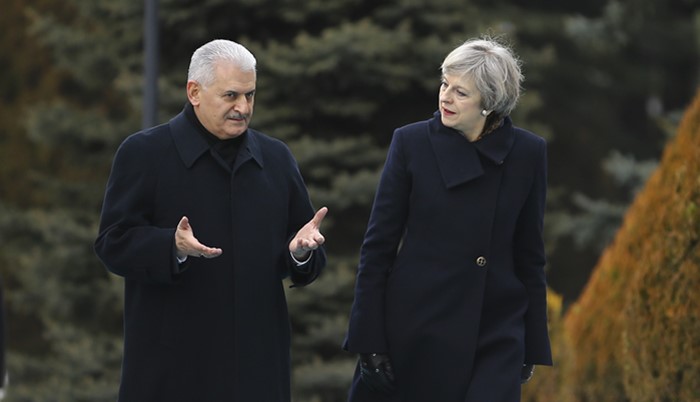Turkish Prime Minister Binali Yıldırım has said he asked British Prime Minister Theresa May to halt the UK activities of the Gülen movement, which the government accuses of masterminding a July 15 coup attempt.
Speaking at a joint press conference with May in Ankara on Saturday, Yıldırım said he briefed his British counterpart on the activities of the Gülen movement in the UK. He also said they had signed an agreement stating that companies in both countries would work to produce a joint warplane.
In her first visit to Ankara as head of government British Prime Minister May said the UK and Turkey would increase trade, after a meeting with President Recep Tayyip Erdoğan on Saturday.
Amid criticism of human rights violations in Turkey following a botched coup on July 15, May briefly touched upon the issue of democracy when speaking with reporters at the presidential palace in Ankara. Praising the Turkish people’s defense of democracy against the coup attempt, she said, “I’m proud that the UK stood with you on July 15 last year in defense of democracy.”
She also added that “now it is important that Turkey sustains that democracy by maintaining the rule of law and upholding its international human rights obligations as the government has undertaken to do.”
May and Erdoğan also reportedly discussed issues of Cyprus and Syria.
Meanwhile, on Friday, Middle East analyst Patrick Cockburn wrote in the Independent that the talks with Erdoğan will be seen as endorsing the destruction of Turkish democracy. He claimed that Erdoğan is replacing democracy with a presidential system as dictatorial and repressive as anything seen in Latin America in the 1960s and 1970s.
A report prepared by the EU Intelligence Analysis Centre (IntCen) revealed that although President Erdoğan and the Turkish government immediately put the blame for the July 15 failed coup attempt on the faith-based Gülen movement, the coup attempt was staged by a range of Erdoğan’s opponents due to fears of an impending purge, according to a report by The Times newspaper on Jan. 17.
“The decision to launch the coup resulted from the fears of an incoming purge. It is likely that a group of officers comprising Gülenists, Kemalists [secularists], opponents of the AKP [Justice and Development Party] and opportunists was behind the coup. It is unlikely that Gülen himself played a role in the attempt,” said the report, dated Aug. 24, 2016.
The Aldrimer.no website reported earlier this week that NATO sources believe the coup was staged by the president of Turkey himself.
Although the sources admit there is no written NATO documentation to support the claim due to its sensitivity, the website said that “the dominant NATO assessment is quite clear.”
Speaking to vocaleurope.com, a former Turkish officer who served at NATO headquarters in Brussels but was sacked and recalled to Turkey as part of an investigation into the failed coup on July 15 claims that the putsch was clumsily executed and never intended to bring down the government, but rather served as a vehicle for President Erdoğan to eliminate opponents and the ultranationalists to take a prominent role in the military and impose their “Eurasian” agenda on the country.
Strongly denying having any role in the putsch, Fethullah Gülen called for an international investigation into the coup attempt, but President Recep Tayyip Erdoğan — calling the coup attempt “a gift from God” — and the government initiated a widespread purge aimed at cleansing sympathizers of the movement from within state institutions, dehumanizing its popular figures and putting them in custody.
More than 135,000 people have been purged from state bodies, in excess of 90,000 detained and over 43,000 have been arrested since the coup attempt.

